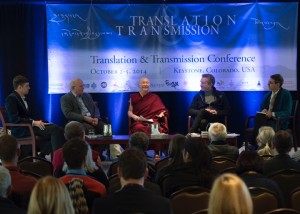Dan Hirshberg, Assistant Professor of Religion, presented new research in a paper titled, “A Yogin’s Retirement: Visionary Tourism in Nyang ral’s Twilight Years,” at the Annual Meeting of the American Academy of Religion. For the panel, “Imagination and Visualization in Tibetan Buddhism,” which was cosponsored by the Tibetan/Himalayan and Tantric Studies groups, he explored subjective depictions of the acute shift from contrived visualization practice into dissociative visionary excursions through the buddha realms.
Hirshberg Publishes Book on Tibetan Buddhism and Cultural Memory
Dan Hirshberg, Assistant Professor of Religion, published his first book, Remembering the Lotus-Born: Padmasambhava in the History of Tibet’s Golden Age (Wisdom Publications, Studies in Indian and Tibetan Buddhism). Relying on textual criticism of 12th-13th-century Tibetan texts and their surviving manuscripts, Remembering the Lotus-Born uncovers genealogies of some of Tibet’s most renowned religious phenomena, breaking new ground by demonstrating how Indian conceptions of karma, reincarnation and textual revelation were assimilated by allegedly enlightened Tibetans of later centuries who, in claiming to remember their past lives, present themselves as direct witnesses of Tibet’s conversion to Buddhism. In thereby seizing a special editorial license for the reformulation of the past, they reconstruct the emic history of Tibet’s golden age.
The collective remembrance of Tibet’s conversion unites Tibetans by means of a common identity drawn from a correlate past. This remains all the more critical as contemporary Tibetans continue to confront the pressures of Chinese administration in Tibet and the cultural diffusion of diaspora beyond it.
Hirshberg Presents Paper at International Conference
Dan Hirshberg, assistant professor of religion, presented new research at the International Association for Tibetan Studies conference, held at the University of Bergen (Norway), June 19–25, 2016. His paper traced the introduction and evolution of the many names of Padmasambhava, an eighth-century tantrika credited with establishing Buddhism in Tibet, which became signposts in the retelling of his biography as well as the foci of countless ritual and devotional liturgies.
Hirshberg Presents Proposal at Japanese Garden Association Conference
Dan Hirshberg, assistant professor in the Department of Classics, Philosophy, and Religion, recently presented UMW’s Zen garden proposal to the Biennial Meeting of the North American Japanese Garden Association, held at the Morikami Gardens in Delray, Fla. His invited paper explored Zen gardens as loci of wellness on college campuses, while highlighting UMW initiatives in Contemplative Studies, Asian Studies, and multiculturalism.
Hirshberg Presents Paper at UVA Symposium
Dan Hirshberg, Assistant Professor of Religion, recently presented a paper for a symposium at the University of Virginia, which brought together scholars from Bibliographical Studies and Tibetan Studies to discuss the physical aspects of Tibetan books. He presented on the codicology and paleography of Tibetan manuscripts on a panel with Professor Jake Dalton (University of California, Berkeley).
Hirshberg Moderates Plenary Session

“Authenticity and Myth-Making” Panelists
From left to right: Dan Hirshberg, Wulstan Fletcher (Tsadra Foundation), Professor Karma Lekshe Tsomo (University of San Diego), Professor Don Lopez (University of Michigan), and Dr. Jules Levinson (UMA Institute).
Dan Hirshberg, Assistant Professor of Religion, moderated the closing discussion of Tsadra Foundation’s Transmission & Translation conference. Since Tibetans began streaming out of Tibet following the Communist Invasions of the 1950’s, this marks the first time that the world’s foremost scholars and translators of Tibetan language materials, both from academia and Buddhist practice communities, both Tibetans and not, were convened to discuss an array of issues concerning the translation of Tibetan into Western languages. His panel on “Authenticity and Myth-Making” was especially provocative in confronting the problem of discrimination in Buddhist scripture, especially with regard to gender, and the question as to whether translators should allow such content to persist in translation, thereby sanctifying discrimination in authoritative sources for contemporary audiences who repudiate such views.